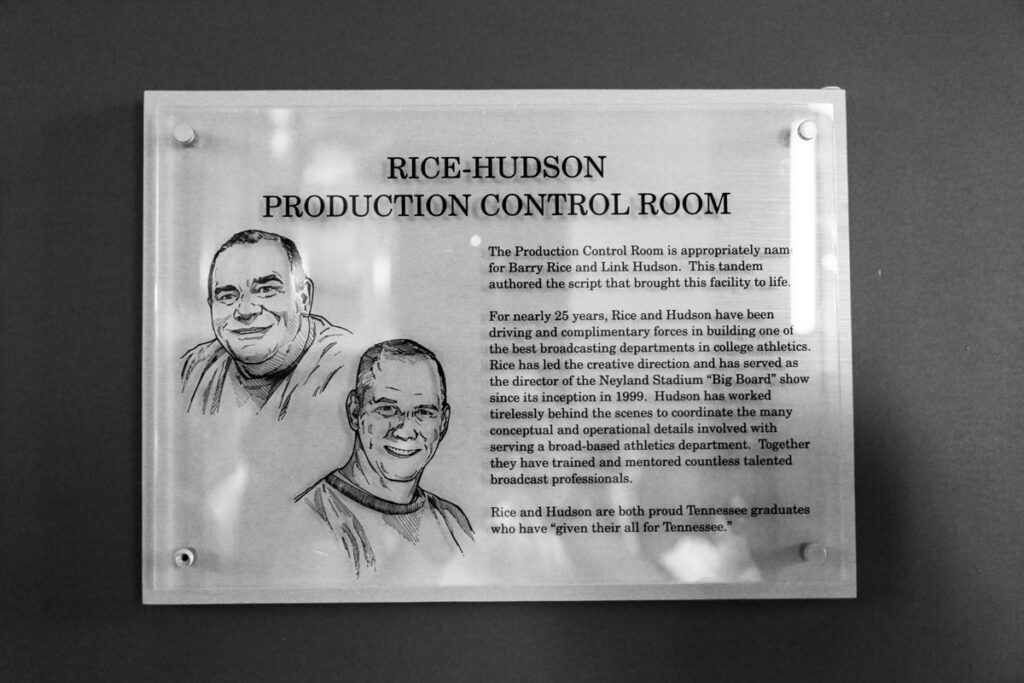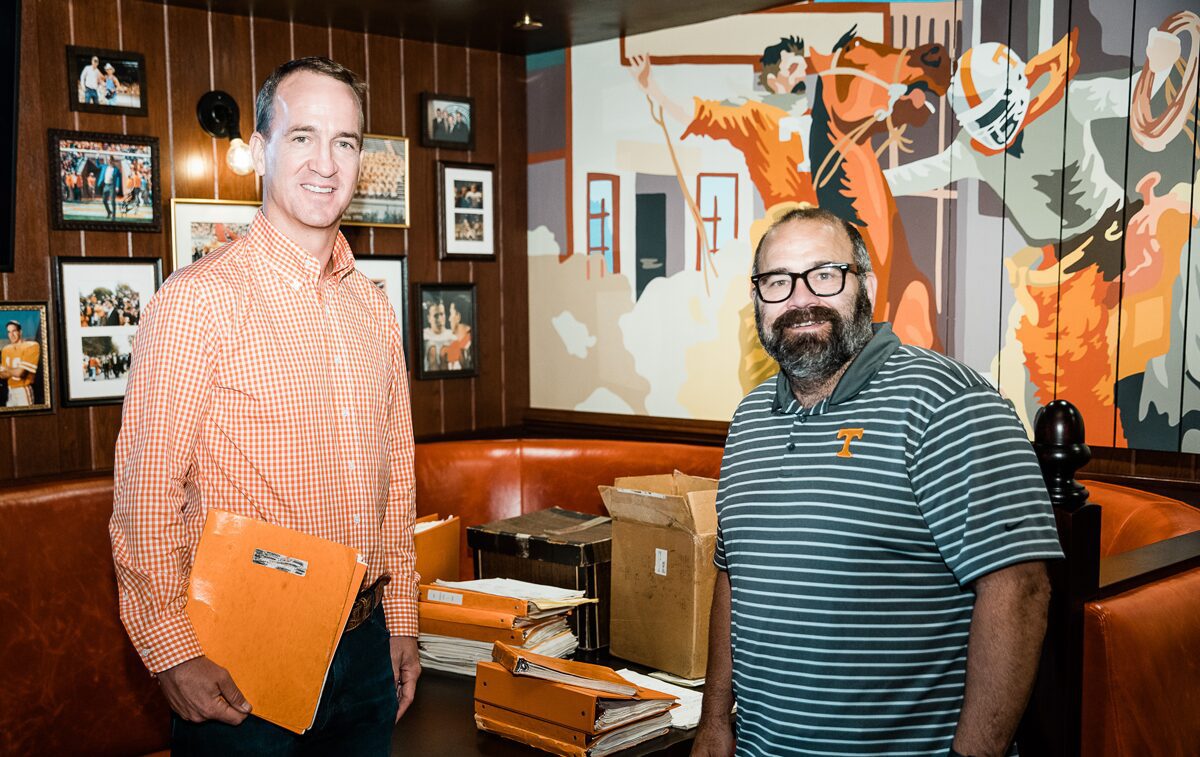The University of Tennessee, Knoxville’s football team has been recording games since the 1920s to scout and evaluate performances. They started by using 16mm film but in 1989 a decision was made to switch to video—which posed a bit of a problem, since no one knew how to use the video editing equipment that had been purchased. Enter Barry Rice (’88), who retired in June 2023 after 34-years at UT Athletics as the creative mind behind the department’s videography.
Starting Out
Rice had recently graduated with a degree in broadcasting and was working at WBIR Channel 10 as a videographer and editor. He’d been there for over a year when he was asked to come back to UT and take over video recording and editing the football team practices and games, and his answer was a resounding yes. After all, the reason Rice got into broadcasting was football.
“When I came to UT, I knew I wanted to do something creative, but I had no idea what that meant. I kicked around advertising, journalism, but what sealed the deal for me was I wanted to work the football games. I noticed people I knew down on the fields pulling cables and I wondered, ‘How do I do that?’ and I started working there,” Rice said.
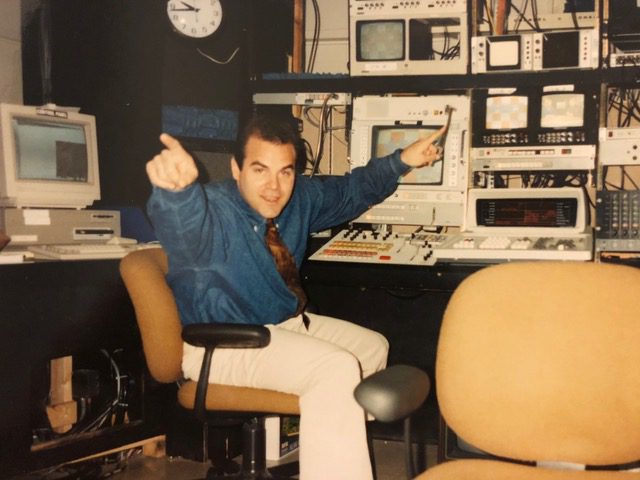
Once he knew what he wanted to do, he got to work taking advantage of every opportunity offered to be a part of recording or broadcasting games. At the time, that meant vying to be one of the few students selected to help with the one or two televised Vols football games of the season. It was an era when ESPN was in its infancy and when most college games were relegated to radio time instead of television.
But, there were still plenty of chances to get experience in the industry, which he was pushed to do by faculty and professionals at UT who noticed a special talent in the young videographer.
“Barry was a very outstanding student, especially in video production and creative type courses. He was one of my first students when I came to UT, and I remember him being very creative, which later turned out to be one of his greatest assets,” said School of Journalism and Media Professor Sam Swan, who founded the broadcasting program at the College of Comunciation and Information.
As he kept working every chance he got, Rice also made relationships with other students and with UT Athletics employees that have lasted for decades. He’s seen some of his colleagues rise through the ranks of sports broadcasting, and he himself became a legacy at UT through his innovative and creative work. He remembers then-general manager of the Vol Network, Mark Dyer, telling a group of broadcasting students to look around at each other because they would be working together for the next 30 to 40 years—a sentiment Rice found unlikely at the time, but turned out to be very true. It was a pivotal and exciting time that set him on the path for the rest of his career.
“The fond memories and feelings I had at that college I just almost can’t describe, and it was such a great time. It was only because of people like Dr. Swan who said you have to get out there on your own, and that’s scary but it got me work experience. They had great production classes, great equipment that was state-of-the art for the time, and I guarantee you it’s state of the art today,” he said.
A Vol for Life
While Rice certainly jumped at the chance to work for UT Athletics when they asked him to take over video recording the games and practices, there were challenges in what was essentially a new position.
“It was a system I’d never worked on, a brand-new technology system, and I had no experience on it. I don’t want to say I lied, but I held back information and started studying up on it quick. It was baptism by fire. That first weekend of football I was up for 36 hours just trying to get the work done,” he said.
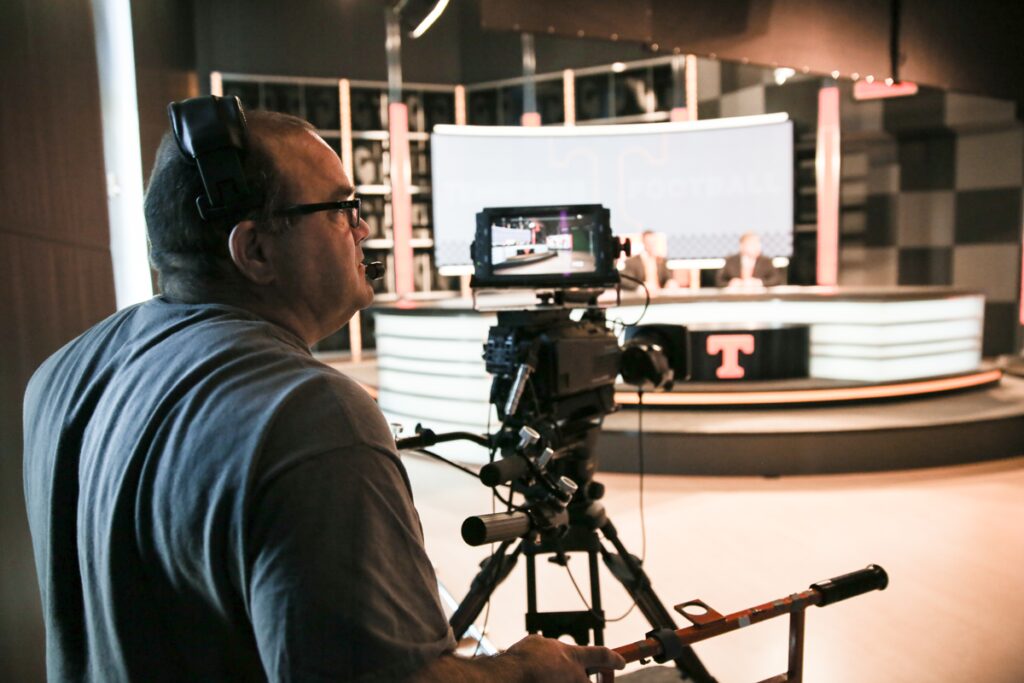
But recording practices and games didn’t scratch Rice’s creative itch and he had his bags packed and was ready to move to Los Angeles to see what he could do there when the director of broadcasting for UT Athletics, Mike Moore, left to work for ESPN. While it took a little convincing for Rice to unpack and stay in Knoxville, he agreed to stay on for two years as the department’s video producer.
“I did want to go to California and I did intend to, but I fell in love. I absolutely loved what I was doing, I absolutely loved who I was doing it for, I absolutely loved everyone I was working with— from student helpers all the way up to senior staff—and it was a great, wonderful run of Tennessee Athletics,” he said.
Rice flourished in his new position and enjoyed keeping up with trends in video production and perhaps even instigating trends in the world of college sports broadcasting. In fact, it got to the point that his videos for recruitment purposes started to raise certain eyebrows.
“We were doing some really innovative and creative things, and the other teams started complaining about it. I got a letter from the SEC commissioner saying, ‘What you’re doing is not illegal but we’d appreciate it if you’d dial it down so it’s not an unfair advantage.’,” Rice recalled. “That was always a feather in my cap, getting a letter from the SEC telling me not to be so creative.”
Rice was the driving force behind founding VFL Films, the broadcasting and media production company for Tennessee Athletics. The department grew from a team of one (himself), to 15 people between 1991 and 2023, and he retired from it knowing that his work and passion would continue on in capable hands.
“I believe it is a young person’s game and you get to a point where you say, my sell-by date has long expired and we need to turn it over to the younger ones and let them show us how it’s done,” he said.
Leaving a Legacy
While Rice was adamantly a behind-the-scenes type of broadcaster, his work has been seen by millions over the years. Whether it was a touching tribute to Pat Summitt or a video to recruit football players, his art has inspired and fired up the audiences at Neyland Stadium and beyond. While many attribute the creativity and innovation of VFL Films to Rice, he has worked hand-in-hand with many people at UT Athletics who he always makes sure to credit: General Manager Steve Early, Director of Broadcasting Bob Kesling, and his partner in video, Senior Director of Video and VFL Films Link Hudson.
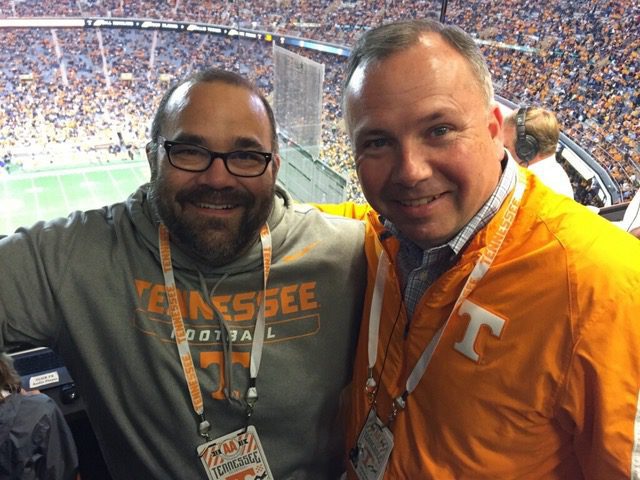
“We were very blessed to have Barry. He’s a great Tennessee Volunteer and I refer to him as a Steven Spielberg; he is an artist first and foremost,” said Early. “This guy really lived a lot of long nights and holidays in an edit bay so Tennessee fans could really enjoy the fruits of his labor. All the great home videos and jumbotron features, and hype videos, recruiting videos, they all stem from the brain and keyboard of Barry Rice and that stuff doesn’t come easy. It takes a long, long time to build those films and files and he was willing to give his all to Tennessee and he did that all for more than 30 years.”
But Rice contributed more than that in his 34 years at UT, as he also mentored many staff and students along the way. Through every change in video technology and all the iterations of viewing media that audiences have had over the years, Rice was learning and teaching his craft. He even keeps a list of the people he’s worked with and mentored who have moved on to other parts of the industry, keeping track of where they are and their successes.
“When these kids went somewhere, when you found out they got hired, there was no better feeling. It was like Christmas to find out they got the job, and you knew it wasn’t just that they got that one job, but that they would go further and someday be running the networks, and some of them are,” he said.
He said it’s been exciting to see not only video technology change, but also the familiarity with video that every new generation of students have. Students went from coming to Rice with barely any knowledge of recording and editing, to this current generation arriving on campus already possessing incredible skills.
“Tennessee has been very blessed to have a guy as talented as Barry and he shared his knowledge with the people who worked under him and the students who came through. A lot of them came here because Barry’s name got out there and people around the country could see what we were doing here and wanted to be a part of that,” said Kesling, who is also known as the “Voice of the Vols”. “The creative world is different sometimes and people have talents that emerge, and Barry was able to find the talent in a lot of people and he challenged people to be their best and be creative and do things differently than everyone else.”
